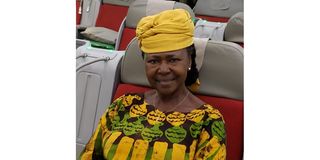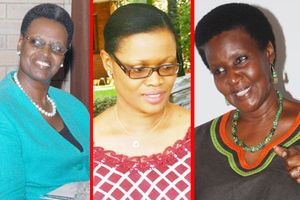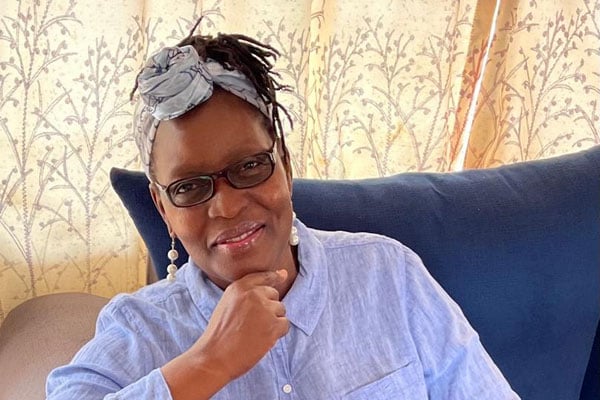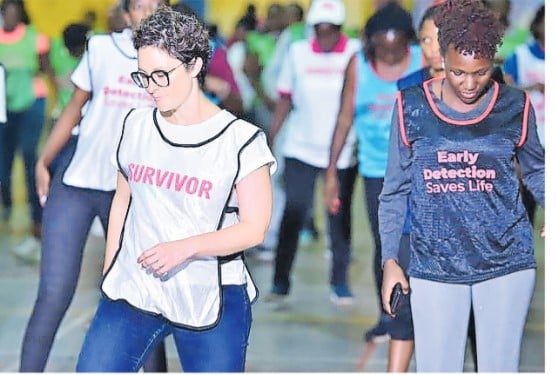
Angelina Chogo Wapakhabulo is passionate about making society better using her
theatrical skills. PHOTOS / COURTESY OF ANGELINA WAPAKHABULO
Meeting Angelina Wapakhabulo is exciting. At 75 years old, she has hearty laughter, so many stories to share, and still cares about representation. For instance, when we met for the interview, she asked for a few minutes to change her outfit to something more colourful.
She later returns wearing a kitenge fabric dress and a lime green head wrap. Angelina has appeared in public for decades wearing a
kitenge fabric dress and a head wrap.
The dress code has a story behind it. Angelina Chogo Wapakhabulo was married to politician James Wapakhabulo. As a supportive wife, she showed up for all the events and needed the right attire.
“One day, I was wearing a gomesi and Papa (James) was holding me by the back, I thought he was showing too much affection that day. When we were just the two of us, he told me the gomesi had moved. That’s when he told me I needed to wear something I found comfortable. Since we attended many events, I found the dresses and the head wrap very manageable,” she says.
But Angelina’s story starts somewhere; she was born in 1949 in Iringa District in southern Tanzania. As a child, she loved music and drama. Often, her father would tell her that she loved joking and playing around like her mother. Studying theatre It was only after Angelina’s father saw a story of hers published that he believed what she was doing was more than playing.
“It was 1968; theatre was not that serious, so no one believed it was a real course,” she says.
Playing around, Angelina would later study theatre arts, literature, and education at the University of East Africa (now University College of Dar es Sa-laam). In 1970, Japan held Expo ‘70 in Osaka; it was the first world fair held in Japan and Asia. The seven-month expo attracted more than 60 million visitors from 78 countries. The total attendance remains the largest in all world fairs until the Shanghai World Expo surpassed it in 2010.
Angelina, alongside others from theatre arts, literature, and education, were among those in attendance. They were representing Tanzania with performances, and most of them including Angelina, were flying for the first time; some were the first in their families to experience travel of that magnitude.

Angelina with her husband James Wapakhabulo at a gathering.
“By the time we returned, there were many stories to tell. The following year, there were more entries in theatre and the arts,” she says.
It was at the University of East Africa that Angelina met and befriended two Ugandan students, James Wapakhabulo and his friend Yoweri Kaguta Museveni.
Other Ugandans at the university included Eriya Kategaya, David Anyoti, Osinde Wangor, Ben Wacha, and Amanya Mushega. The group later returned to Uganda and helped shape the country’s politics. James, whom she often refers to as Papa, would later become Speaker of Parliament and later minister of foreign affairs.
Angelina says at the time, there was little theatre to offer, so she practised as a teacher and rose to head teacher. Either way, she still had opportunities to be an artist through different competitions and radio plays.
James moved to Papua New Guinea as first a senior legal draftsman and then a principal legal officer. Angelina moved with him. In Papua New Guinea, there was a vibrant arts scene, so Angelina performed a lot. She says they became local celebrities.
“When we returned to Uganda, Papa took me to the National Theatre, I wanted to see how I could fit in,” she says.
Leaving theatre She attended several shows at the time, though she was eventually drawn to James' political ambitions. “I became inclined to play my part in ways that I could; that is how I started working with orphans, maternal health, and women groups in the constituency and I did not have time for theatre,” she says.
She did not entirely give up though; she had started working on campaigns to sensitise informal communities, such as markets. As they gave out flyers detailing the importance of safe sex and testing for HIV in markets, among other measures, they also wrote songs and skits to push the message further.
Working with vendors in markets also taught Angelina a few things. For instance, a large number of women in the market worked for more than 10 hours and barely found time to go to the hospital. She worked with women in 13 districts.
In 2006, they were invited to showcase in Canada. The market vendors wrote a skit and songs they used to demonstrate how they create awareness about HIV/AIDS.
“I wrote a skit that we ended up performing three times in Toronto. The vendors were happy; many of them had left Kampala for the first time,” she says.
Charity
That was one of the first times she had written after a long time. The shows were interactive, mostly about peer educators talking to people about the need for medication. Angelina’s list of charitable organisations she has been associated with includes the United Way Uganda (as a founding member and founding co-chair of its governing board); Cure Uganda (a specialty teaching hospital that treats children afflicted by neurosurgical conditions); the Uganda Women’s Effort to Save Orphans (UWESO); The Aids Support Organisation (TASO);
Forum for African Women Educationalists Uganda (FAWE-U); SOS Children’s Village Uganda; the Uganda Red Cross; as well as Women International Maternity Aid (WIMA). On the international scene, she served as a Uganda community member of the steering committee for the Development of Anti-Retro-viral Therapy Trials (DART) in Africa, and has been on the board of the Aids Healthcare Foundation and the Microbicide Development Programme Steering Committee (under Imperial College London) in the fight against HIV/Aids in Uganda.
In 2009, she was appointed Uganda’s ambassador to Kenya, a position she filled for seven years. She got the appointment at the time the two countries were in a diplomatic row over a small island on Lake Victoria. Even during her stay in Kenya, she was still in touch with the vendors; in fact, they went on to make trips to sensitise market vendors in Nairobi, Mombasa, and Lusaka.
Artistic Angelina
When she was done with diplomatic work in 2016, she left the city. “I had stayed in the city for years, and I was tired of the traffic and the noise...so when I returned, I went straight to Sironko District. I wanted to have a base, a place where my grandchildren could
visit,” she says.
There, she would meet up with other people at malwa bars, which she says are good for information gathering and catching up. “It was easy to know who has died and how the burial arrangements are through such engagements," she says.
There are many characters at malwa bars, those who pay for their drink, those who don’t pay but have juicy conversations, and those who have the latest local and international information. It was at these rounds that her artistry was reignited. She started writing stories most of which were personal experiences. There were many stories and observations that she developed into short stories.
“For instance, when a family has a sick person, people with good intentions show up to give them company. In the long run, the people offering support become a burden more than the sick,” he says.
Her writings and stories were the subject of the comedy show Laugh With Her, starring Daniel Omara, Okello Okello, and Pablo. She says the documentation is about her life right now and the experiences she cannot change for anything.
“Pablo and I, go a long way, when I had written a lot and asked him if he could put it on stage, and he could, and the rest is history," she says.
The production ties into most of Angelina’s charity works; it is a fundraiser for the Cure Brain Surgery Run. The run is one of the many ways Angelina and her family fundraise for free surgeries for children born with hydrocephalus. The condition occurs when the body
makes more cerebrospinal fluid than the brain absorbs. This leads to an abnormal growth in the head.
“It is something that my family has been part of; Papa did a lot in establishing Cure Children’s Hospital in Uganda. It was the first hospital of a kind in Uganda,” she says.
The cause
The hospital based in Mbale was initially supposed to be elsewhere; Angelina says it was James who convinced Cure International to bring the hospital to Mbale, considering that most facilities are allocated to the central, Kampala to be specific.
The hospital was opened in 2001 and built in a dangerous area in Mbale. She says people used to fear passing through that area at certain times of the day because they associated it with insecurity.
“Putting a hospital there was equivalent to bringing new hope to such a place. When the hospital was opened, I was one of the pioneer board members; I have been a board member since,” she says.
The hospital offers free surgeries for children from different parts of Uganda. She says, at first, the surgeries were supposed to be cheap, but people would not come back when they were asked to pay, for instance, Shs100,000. They resolved to provide the service
free of charge, however, after the pandemic in 2020, funding the surgeries became hard since donors around the world withdrew resources.
With many of these conditions common among babies in rural areas, Angelina says they have many repercussions, including domestic abuse.
Thus, fundraiser events such as the comedy show on Friday and the run on October 19 later this year are vital. Besides fundraising, she says the run is also intended to create awareness about Cure Children’s Hospital and their service to help unsuspecting parents who may not have an idea of what to exactly do with their children with hydrocephalus.
Since 2001, Cure Uganda has performed more than 16,000 surgeries for patients with hydrocephalus across Africa and has trained 65 neurosurgeons from around the world on the ETV procedure. During the 2022 fiscal year, Cure Uganda performed 1,700 neurosurgeries, 500 of which involved the ETV procedure.





